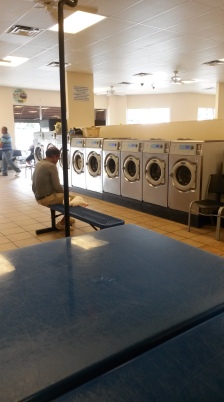For me, turning on the ignition, tossing the map out the window and heading to unknown destinations is a delightful adventure. Traveling beyond city limits rea dily provides a glimpse into our gentler past for there still remain worn reminders aplenty. If you have ever followed a narrow spit of asphalt past county lines where decades of saw-tooth fractures have been patched with heavy tar leaving a zig zag pattern like errant lightning strikes, you know what I’m talking about. Along these leftover remnants of our original highway system sit strings of motor and auto courts…motor hotels, better known as motels dotting the landscape.
dily provides a glimpse into our gentler past for there still remain worn reminders aplenty. If you have ever followed a narrow spit of asphalt past county lines where decades of saw-tooth fractures have been patched with heavy tar leaving a zig zag pattern like errant lightning strikes, you know what I’m talking about. Along these leftover remnants of our original highway system sit strings of motor and auto courts…motor hotels, better known as motels dotting the landscape.
In their heyday, over 60,000 dotted the countryside, forged from America’s burgeoning love affair with the automobile. No longer relegated to a limited radius of travel, families set out to explore beyond their backyards, the promise of excitement whistling in the wind. My own memory is a flashback to the late 60’s for our yearly spring trek from central Illinois to St. Petersburg, Florida to visit cousins. Stuffing our old station wagon with suitcases, pillows and bodies, off we’d go. At the end of the day, my father would begin looking for his favorite lodging establishment, easily identified by their bright orange roofs, capped off with a cupola and weather vane. Howard Johnson’s, a popular no frills chain, became famous for their “fried clams” and 28 flavors of butterfat rich ice cream. At the tender age of ten, the only idea worse than eating worms would be try fried clams. On the other hand, 28 opportunities to savor creamy deliciousness other than vanilla…my definition of heaven. Back then, travel was about the journey, not the destination.
During their infancy, the basic motel model of construction was simple and almost Bohemian. Designed economically, they were usually L or U shaped, framed a public lawn and fondly referred to as cottage or motor courts. Family and automobile friendly, they allowed guests to park conveniently next to their rooms. Unlike their snooty city counterparts, these roadside retreats stressed function not fancy. Travel time between large cities could take up to two or three days and these “Mom & Pop” sites became oases for as each motel popped up, so did diners, filling stations and general stores. The promise of a warm shower and cozy bed beckoned weary travelers when the warm glow of red, blue and green electric neon signs, piercing the night sky like a lighthouse beacon, loomed on the horizon.
 Regarded as the original first motel, Milestone Mo-tel built in San Louis Obispo offered a two room bungalow with a drive-in garage for $1.25 per night. Located within a day’s driving from Los Angeles, the builder, Arthur Hienemen had a vision of building several motels all the way to Seattle like stepping stones along the coast. Instead of Holiday Inns, we might have seen Hieneman Inns if it hadn’t been for The Depression.
Regarded as the original first motel, Milestone Mo-tel built in San Louis Obispo offered a two room bungalow with a drive-in garage for $1.25 per night. Located within a day’s driving from Los Angeles, the builder, Arthur Hienemen had a vision of building several motels all the way to Seattle like stepping stones along the coast. Instead of Holiday Inns, we might have seen Hieneman Inns if it hadn’t been for The Depression.
Another noteworthy motel was The Sanders Court in Corbin, KY. Unlike others, their accommodations included not only tile baths but an abundance of hot water! Instead of a simple mattress, guests would enjoy a Perfect Sleeper bed along with air conditioning and a radio in every room. Today, a Kentucky Fried Chicken stands on the site where Harland Sanders began his empire but one can still find postcards of the original Sanders Court in local antique stores. Stories such as these can be found in every black dot on every map of every state.
The 1950’s saw a booming expansion of motels as America took to the road in earnest. Not satisfied with mere day trips, people set out to find what lay across the country. This period also ushered in the terms “Novelty”, “Googie”, and “Doo Wop” architecture. Wigwams, teepees and even decommissioned railroad cars were used as accommodations. These quirky motels thrived, popularizing the term kitschy, describing something so tacky that it holds a special appeal. And the quirkiness didn’t stop on the outside. Ask any person under the age of forty to tell you about their experience with “Magic Fingers” you’ll likely be shunned as a slightly odd individual. Truth is these mechanical devices were attached to almost every bed in every motel at one time. For a quarter,  a person received fifteen minutes of vibrating mattress bliss designed for relief from everyday stress. Ah, they knew how to cater to those traveling salesmen back then. When coupled with the advent of swimming pools, steam heat in the winter and air conditioning, free TV and phones, an overnight motel stay was a bargain at $8.00 – $10.00 per night.
a person received fifteen minutes of vibrating mattress bliss designed for relief from everyday stress. Ah, they knew how to cater to those traveling salesmen back then. When coupled with the advent of swimming pools, steam heat in the winter and air conditioning, free TV and phones, an overnight motel stay was a bargain at $8.00 – $10.00 per night.
A short time later, a certain gentleman returned home from a family trip, terribly disappointed with the motels he had visited on his trip to Washington, DC. Some facilities were filthy, others spotless. Some offered dining, others didn’t and not all offered swimming pools. A successful real estate developer, Mr. Kemmons Wilson decided to build his first motel along the main highway in Memphis. Every one he built thereafter would be the same, offering televisions, air conditioning, a swimming pool and a restaurant. He believed the amenities offered in Daytona Beach should be the same amenities offered in Memphis. His motel was named after a delightful musical starring Fred Astaire and Bing Crosby called Holiday Inn. (See…Mr. Heineman really was onto something.)
With his simple idea, Mr. Kemmons created the franchise chain concept. Only three years later, another began in Arizona opening with the moniker of Ramada, Spanish for “a shaded resting place”. Others obviously followed, but the creation of the first national room reservation system belongs to Holiday Inn. For the independent owners, membership in this system appeared to be a double edged sword. By joining, individual establishments would be included in a roster promising high standards to their customers. In the long run, however, being represented by a franchise chain came at a cost…a cost, in the long run, most couldn’t afford. Furthermore, for the vast majority, the introduction of the US Interstate System signaled the beginning of their descent into obscurity.
Perhaps you may have heard of Amboy, California, home to Roy’s Motel and Café. No? Don’t feel bad. I hadn’t either. However, almost everyone is familiar with the “Main Street of America” – Route 66. This particular highway, the crown jewel of the transportation system, originally ran all the way fr om Chicago, IL to Santa Monica, CA slicing through the heart of middle America. From one end to the other, little blips of homespun hospitality sprang up around the motels built on that famous stretch. People really did get their kicks on Route 66. Amboy’s existence, single handedly built by Roy Crowl in the 1940’s, became a bustling desert pit stop. Besides Roy’s Motel and Café, Mr. Crowl along with his son eventually opened a gas/service station which kept them both busy 24 hours a day, seven days a week. At the time, the population of Amboy numbered around 700. However, on a sunny afternoon in 1972, all that changed. Interstate 40 opened, bypassing nearly all the towns and motels whose existence depended on a steady stream of traffic. With a stroke of a pen, these delightful little boroughs swiftly turned into ghost towns, dust bowls frequented by tumbleweeds.
om Chicago, IL to Santa Monica, CA slicing through the heart of middle America. From one end to the other, little blips of homespun hospitality sprang up around the motels built on that famous stretch. People really did get their kicks on Route 66. Amboy’s existence, single handedly built by Roy Crowl in the 1940’s, became a bustling desert pit stop. Besides Roy’s Motel and Café, Mr. Crowl along with his son eventually opened a gas/service station which kept them both busy 24 hours a day, seven days a week. At the time, the population of Amboy numbered around 700. However, on a sunny afternoon in 1972, all that changed. Interstate 40 opened, bypassing nearly all the towns and motels whose existence depended on a steady stream of traffic. With a stroke of a pen, these delightful little boroughs swiftly turned into ghost towns, dust bowls frequented by tumbleweeds.
With travel based on expediency and the life blood of motels dwindling away, most of these iconic structures were soon abandoned, demolished or worse, maintained as “cockroach motels” renting rooms by the hour.
While most have gone the way of the dodo, a few gems remain. Across the country, popular tourist attractions and beach communities proudly promote these old motels, lovingly restored and owned by people ready to cater to their clients whom they regard as family. The décor may have remained the same, the size of the complimentary soap useful for only one shower and towels the size of dish cloths still as rough as a loofah but if you find yourself off the beaten path, they are definitely worth the price. Who knows? You may even be lucky enough to stumble on the rare motel offering those “Magic Fingers”. If not, I know a vendor who sells them on Ebay for a song.
 ould lovingly describe him as a curmudgeon but that particular adjective would not suffice to explain his complicated yet endearing personality.
ould lovingly describe him as a curmudgeon but that particular adjective would not suffice to explain his complicated yet endearing personality. ut doggie treats to Charlie.
ut doggie treats to Charlie. vehicle or an animal caught in a swirling current, steering their fishing boats and checking houses one at a time. The rain, dumping buckets of water, washed away homes, cars, enveloped major highways and buildings. But the rain washed away something more. In the midst of this deluge, the rain washed away color, ethnicity, religion and thankfully, division. Without fanfare, unsung heroes and heroines jumped into action to help their community. Why does it seem to take a catastrophic event to bring a halt to the division and bring back the best of human nature again?
vehicle or an animal caught in a swirling current, steering their fishing boats and checking houses one at a time. The rain, dumping buckets of water, washed away homes, cars, enveloped major highways and buildings. But the rain washed away something more. In the midst of this deluge, the rain washed away color, ethnicity, religion and thankfully, division. Without fanfare, unsung heroes and heroines jumped into action to help their community. Why does it seem to take a catastrophic event to bring a halt to the division and bring back the best of human nature again?
 nd although they had already called the winner, everyone was waiting for the last straggling swimmer to complete his leg. Out of the four or five lanes, he was the only one remaining in the pool.
nd although they had already called the winner, everyone was waiting for the last straggling swimmer to complete his leg. Out of the four or five lanes, he was the only one remaining in the pool. on the strength. It didn’t matter what school they represented, what religion they observed, the color of their skin or where their family came from. They were simply young swimmers doing what they loved.
on the strength. It didn’t matter what school they represented, what religion they observed, the color of their skin or where their family came from. They were simply young swimmers doing what they loved.

 lunteered to fire the gun. When it went off, surprisingly Mr. Treat shot off the line like a dart. I have to admit all sorts of thoughts went through my mind at the time but despite the fact he pulled ahead in the beginning, I overtook him midway and triumphed in the end. One thousand milkshakes were ours…at least for the next 24 hours.
lunteered to fire the gun. When it went off, surprisingly Mr. Treat shot off the line like a dart. I have to admit all sorts of thoughts went through my mind at the time but despite the fact he pulled ahead in the beginning, I overtook him midway and triumphed in the end. One thousand milkshakes were ours…at least for the next 24 hours. hesitated. For one thing, this gentleman named Sven didn’t sound even remotely like a fair haired Norwegian individual. He possessed the distinct accent of someone from a country located near the Bay of Bengal or perhaps the one adjoining beginning with the letter “P”.
hesitated. For one thing, this gentleman named Sven didn’t sound even remotely like a fair haired Norwegian individual. He possessed the distinct accent of someone from a country located near the Bay of Bengal or perhaps the one adjoining beginning with the letter “P”.
 dily provides a glimpse into our gentler past for there still remain worn reminders aplenty. If you have ever followed a narrow spit of asphalt past county lines where decades of saw-tooth fractures have been patched with heavy tar leaving a zig zag pattern like errant lightning strikes, you know what I’m talking about. Along these leftover remnants of our original highway system sit strings of motor and auto courts…motor hotels, better known as motels dotting the landscape.
dily provides a glimpse into our gentler past for there still remain worn reminders aplenty. If you have ever followed a narrow spit of asphalt past county lines where decades of saw-tooth fractures have been patched with heavy tar leaving a zig zag pattern like errant lightning strikes, you know what I’m talking about. Along these leftover remnants of our original highway system sit strings of motor and auto courts…motor hotels, better known as motels dotting the landscape. Regarded as the original first motel, Milestone Mo-tel built in San Louis Obispo offered a two room bungalow with a drive-in garage for $1.25 per night. Located within a day’s driving from Los Angeles, the builder, Arthur Hienemen had a vision of building several motels all the way to Seattle like stepping stones along the coast. Instead of Holiday Inns, we might have seen Hieneman Inns if it hadn’t been for The Depression.
Regarded as the original first motel, Milestone Mo-tel built in San Louis Obispo offered a two room bungalow with a drive-in garage for $1.25 per night. Located within a day’s driving from Los Angeles, the builder, Arthur Hienemen had a vision of building several motels all the way to Seattle like stepping stones along the coast. Instead of Holiday Inns, we might have seen Hieneman Inns if it hadn’t been for The Depression. a person received fifteen minutes of vibrating mattress bliss designed for relief from everyday stress. Ah, they knew how to cater to those traveling salesmen back then. When coupled with the advent of swimming pools, steam heat in the winter and air conditioning, free TV and phones, an overnight motel stay was a bargain at $8.00 – $10.00 per night.
a person received fifteen minutes of vibrating mattress bliss designed for relief from everyday stress. Ah, they knew how to cater to those traveling salesmen back then. When coupled with the advent of swimming pools, steam heat in the winter and air conditioning, free TV and phones, an overnight motel stay was a bargain at $8.00 – $10.00 per night. om Chicago, IL to Santa Monica, CA slicing through the heart of middle America. From one end to the other, little blips of homespun hospitality sprang up around the motels built on that famous stretch. People really did get their kicks on Route 66. Amboy’s existence, single handedly built by Roy Crowl in the 1940’s, became a bustling desert pit stop. Besides Roy’s Motel and Café, Mr. Crowl along with his son eventually opened a gas/service station which kept them both busy 24 hours a day, seven days a week. At the time, the population of Amboy numbered around 700. However, on a sunny afternoon in 1972, all that changed. Interstate 40 opened, bypassing nearly all the towns and motels whose existence depended on a steady stream of traffic. With a stroke of a pen, these delightful little boroughs swiftly turned into ghost towns, dust bowls frequented by tumbleweeds.
om Chicago, IL to Santa Monica, CA slicing through the heart of middle America. From one end to the other, little blips of homespun hospitality sprang up around the motels built on that famous stretch. People really did get their kicks on Route 66. Amboy’s existence, single handedly built by Roy Crowl in the 1940’s, became a bustling desert pit stop. Besides Roy’s Motel and Café, Mr. Crowl along with his son eventually opened a gas/service station which kept them both busy 24 hours a day, seven days a week. At the time, the population of Amboy numbered around 700. However, on a sunny afternoon in 1972, all that changed. Interstate 40 opened, bypassing nearly all the towns and motels whose existence depended on a steady stream of traffic. With a stroke of a pen, these delightful little boroughs swiftly turned into ghost towns, dust bowls frequented by tumbleweeds.

 ng construction on our house, it became necessary to find such a place since we wouldn’t be out of the RV for at least two months. Left with no choice, I found one not too far away located in a strip mall flanked by a feed store on one side and a Mexican restaurant on the other. I entered with a measure of trepidation only to be pleasantly surprised. The place was spotless, maintained by a crew of ladies who greeted me warmly as I walked through the door. The walls were lined with at least 100 washers and 100 dyers, most of them moving and shaking at full tilt. An abundant number of roller wire baskets languished to assist moving wet clothes to the dryer. This became my home away from home for at least ninety minutes for the next two months.
ng construction on our house, it became necessary to find such a place since we wouldn’t be out of the RV for at least two months. Left with no choice, I found one not too far away located in a strip mall flanked by a feed store on one side and a Mexican restaurant on the other. I entered with a measure of trepidation only to be pleasantly surprised. The place was spotless, maintained by a crew of ladies who greeted me warmly as I walked through the door. The walls were lined with at least 100 washers and 100 dyers, most of them moving and shaking at full tilt. An abundant number of roller wire baskets languished to assist moving wet clothes to the dryer. This became my home away from home for at least ninety minutes for the next two months.